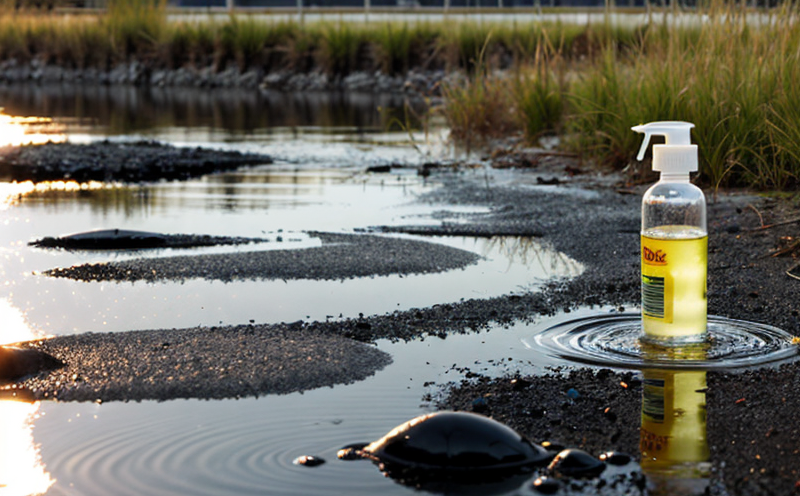APHA 2540D Total Suspended Solids Test in Water
The APHA 2540D method is a widely recognized approach for determining the concentration of total suspended solids (TSS) in water. TSS refers to all particles that can be retained by filtration and includes both organic and inorganic materials present in water, such as silt, clay, finely divided organic matter, bacterial colonies, and other microscopic organisms.
This test is critical for ensuring water quality meets regulatory standards and environmental protection goals. Regulatory bodies like the U.S. Environmental Protection Agency (EPA) use these measurements to monitor pollution levels and assess treatment processes in wastewater facilities. The APHA 2540D method involves filtering a known volume of water through a pre-weighed filter, drying it at specific temperatures, and then reweighing it after cooling.
The measurement is expressed as milligrams per liter (mg/L), which provides valuable insight into the turbidity and clarity of water samples. This metric helps in understanding the impact of suspended particles on aquatic ecosystems and human health. Suspended solids can affect the aesthetic quality, taste, odor, and color of drinking water.
The APHA 2540D method is particularly useful for assessing industrial wastewater discharge, surface waters, potable water supplies, and stormwater runoff. Compliance with environmental regulations such as ISO 17833:2016 ensures that the testing process adheres to international standards. By employing this method, laboratories can contribute significantly to maintaining public health and environmental safety.
The APHA 2540D test is not only a regulatory requirement but also an essential tool for R&D teams in pharmaceuticals, food & beverage manufacturing, and chemical processing industries. These sectors rely on precise TSS measurements to ensure product quality and process efficiency. For instance, pharmaceutical companies may use this method to monitor the cleanliness of their water supply to prevent contamination during production processes.
Furthermore, the APHA 2540D test plays a crucial role in wastewater treatment facilities where it helps operators track the effectiveness of sedimentation tanks and filtration systems. This allows for real-time adjustments to improve treatment efficiency and reduce discharge into receiving waters.
Scope and Methodology
The APHA 2540D method encompasses a series of steps designed to accurately measure total suspended solids in water samples. The primary objective is to quantify the mass of particles retained on a filter during filtration, which provides insight into the turbidity and clarity of the water.
- Sample Collection: Collect representative water samples from various locations within the sampling area. Ensure that the sample container is clean and free from contamination.
- Filtration: Filter the collected water through a pre-weighed filter, typically with a pore size of 0.45 micrometers or less. This ensures that only suspended solids are retained on the filter.
- Drying: Dry the filter at a temperature range between 103°C to 105°C for at least four hours. The drying process is crucial to remove any moisture from the filter, ensuring accurate mass measurements.
- Weighing: After drying, allow the filter to cool in a desiccator and then reweigh it. The difference between the initial and final weights represents the total suspended solids content of the water sample.
The APHA 2540D method is recognized for its simplicity and reliability, making it a preferred choice for laboratories conducting routine TSS testing. Compliance with this standard ensures consistent results across different facilities and operators.
Use Cases and Application Examples
The APHA 2540D total suspended solids test is used across various sectors to ensure water quality meets regulatory standards. In the food & beverage industry, this method helps in maintaining hygiene during production processes by ensuring the water supply is free from excessive particulate matter.
For pharmaceutical companies, TSS testing is crucial for preventing contamination and ensuring product purity. By monitoring the water used in manufacturing, they can identify potential sources of contamination early on.
In wastewater treatment facilities, this test provides critical data to operators. By tracking the amount of suspended solids removed by sedimentation tanks and filtration systems, plant managers can optimize processes and reduce environmental impact.
For industrial plants that discharge water into surface waters, compliance with TSS limits is essential. The APHA 2540D method helps these facilities meet regulatory requirements and avoid fines or sanctions.
Additionally, this test is valuable for research purposes in academic settings where understanding the impact of suspended solids on aquatic ecosystems is critical. Scientists can use this data to model environmental changes and develop strategies for mitigating pollution.





